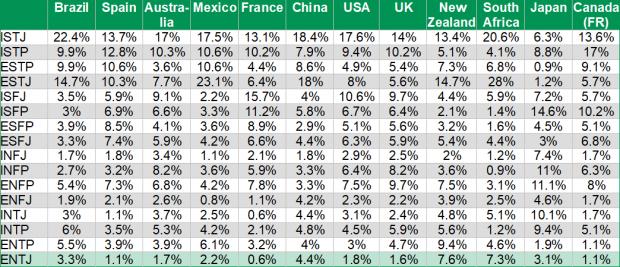Im just coming here to say that people here are appearing with theories that goes against ethic code of MBTI (the Gifts Differing philosophy that all types are equal in strengths, weakness, intelligence, goodness... which is a very half-true). But, perhaps, I prefer to jump out with facts that comes out of my own knowledge that goes against that philosophy, so in order to maintain the poor MBTI ethic code, Im going to describe only patterns and wont mention where the pattern comes from, or being too much specific, I will just stating that they do exist. So, here are my two points:
- First, I do have a more complete info on this topic. I have been waiting MBTI official folks to update and include other countries which are in "soon" state so I could post a more complete picture of MBTI types and world, so I am going to post here a table with more or less 20 countries with MBTI distribution soon (in some weeks). I already had posted in another forum (and that needs update as well) of 12 different countries (that needs to update to include more countries):
- The darwinist theory of types is presented here in a quite inaccurate reading of Darwin and also of types. But just let, for the sake of theory, admit that it is real, that the most common types are the most adapted ones and the rarer types are the less adapted ones. Then, if it is real:
a) In capitalistic ways, admitting the fallacy and lie that we all live in a meritocracy (at least for US), then the most adapted and most common types should be the ones with the highest income, whereas the rarest ones should be the ones with lowest incomes. Well, that doesn't happen. There are at least 3 different sources of type and income over the internet, and most of them points that ENTJ does well financially, ranking in 1st or 2nd, while it is a uncommon type (and the most rare in US where these income surveys comes from, meaning that the most rare type in the US is the 1st or 2nd most rich in average).
b) If we put capitalistic stuff apart, and use IQ instead, ignoring the intelligence out of IQ for the sake of not going into human intelligence topic in depth, the INFJ type, although in rarity, it is relatively favoured in terms of IQ when compared to types in average. The pattern of -> The most common, more IQ, doesnt happen.
c) If we put the IQ and income stuff apart, considering rather "country development", then we might suppose that, since the most common types are the most evolved ones, then we might expect that common types explode in develop countries, and expect that rare types does appear more in underdeveloped countries. Well, that doesnt happen either.
d) One Darwinist aspect ignored here is that new species dont pops out of nowhere and fast, its a long and slow process that takes centuries or thousands of years, rather than decades. I have been speculating the past distribution of personality types, and, through some projections, it is quite likely that INFJ is one of the most recent types, and that there was no INFJ in tribal stage and they should be nearly non-existent in old ages. Still on Darwin line of types that is quite unlikely to be accurate, a rare specie could be either a new one OR one in danger or perhaps some combo of that that is possible as well.
e) People love speculating or sometimes affirming this with conviction: "Types are genetics". Well, none of them so far show studies (excepts perhaps for E/I) stating that type is indeed genetic. And some people over the internet has showing up with statements (Im one of them): "My parents type and preferences are very different than mine".
f) Just to do a reinforcement: Preferences doesn't equal skills.
So, yeah, please dont buy this idea that INFJ is a rare type because they are sub-developed and non-adaptive in comparison with others, that is super inaccurate. I am with the opinion that this rarity is more like a double-side coin: In one side, there is indeed the "special snowflake" feeling, and, with that special snowflake feeling, comes the correct impression that it is harder to connect with others when you are so different. I do like INFJ types, although I never met anyone in real life either.


